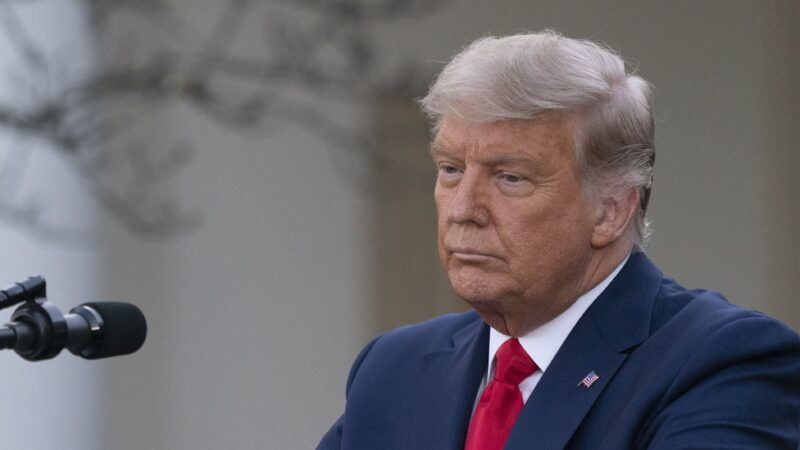Nevada Supreme Court Becomes the Latest To Reject Republican Election Fraud Lawsuit
Plus: State legislator considering tax on online shopping for residents of New York City, how cops really caught the Golden State Killer, and more...

In a unanimous vote, Nevada Supreme Court justices ruled against a lawsuit seeking to overturn the state's presidential election results. A federal district court in Nevada had ruled against the challenge—brought by Nevada Republican electors—last week. They appealed.
The Tuesday decision from the Nevada Supreme Court affirms the lower court's ruling, writing that the Republican challengers had not identified any flaws in that earlier decision.
"Despite our earlier order asking appellants to identify specific findings with which they take issue, appellants have not pointed to any unsupported factual findings, and we have identified none," write the justices.
The "Nevada lawsuit included baseless allegations that more than 61,000 people voted twice or from out of state," notes The Washington Post. "Although Trump campaign lawyer Jesse R. Binnall said last week a 'robust body of evidence' supported his claim that the state's six electoral votes were 'stolen' from the president, Nevada Attorney General Aaron D. Ford (D) had challenged Trump's attorneys to present any evidence supporting the unfounded allegations."
Ford tweeted yesterday that he and members of his office had "met Pres. Trump & surrogates in court a lot. They never once presented sufficient evidence of widespread fraud. Yes, they spouted nonsense in the media. But they NEVER backed it up in court. That's why they always lost. And that's why they lost again tonight."
Ford thanked the lawyers on the case for "defending Nevada's elections from meritless claims of widespread fraud."
The Nevada decision came on the same day that the U.S. Supreme Court refused to intervene in a lawsuit challenging Pennsylvania election results.
FREE MINDS
New information challenges the official narrative on how law enforcement caught the Golden State Killer. "Investigators and prosecutors said the investigation relied on genetic information people voluntarily made public, though with little reason to suspect it might incriminate members of their families in crimes," notes the Los Angeles Times. "The actual investigation was broader and more invasive, conducted without a warrant, and appeared to violate the privacy policy of at least one DNA company."
FREE MARKETS
Legislator proposes that New York City levy a tax on online shopping to pay for the city's public transportation system. Since the start of the pandemic, shopping online has become more of a necessity—and some officials apparently want to either discourage this safety measure or see that the government profits from it. A new bill proposed by Robert Carroll, a state legislator from Brooklyn, would add a $3 tax to purchases made online, exempting goods like food and medicine. "It's to nudge people to shop local and incentivize that," Carrol said in November. "It's also to say 'hey there's a cost to online delivery, there are multiple trucks, delivery trucks on my block every single day, there are tons of cardboard and plastic."
QUICK HITS
Good morning. Students at Howard University Law School spent the last 3 months observing the casual cruelty of local criminal court. During a pandemic. Still prosecutors ignored humanity. Still judges caged hundreds. They just released a report. Must read: https://t.co/zxvHo73Ndn https://t.co/sbzWjWbaAq
— Scott Hechinger (@ScottHech) December 9, 2020
• California sheriffs are still rebelling against the state's latest pandemic restrictions.
• The problems with America's pandemic response go way beyond President Donald Trump, argues Matthew Yglesias.
• For once, a positive update on the prosecution of former Backpage executives:
The Ninth Circuit Court of Appeals today issued an order in the case of journalists Michael Lacey and Jim Larkin, ex-owners of Backpage, ordering the gvt to respond to a petition to remove Judge Susan Brnovich as trial judge.
Plz see: https://t.co/CFmBM1duMM (Thread)— Stephen Lemons (@stephenlemons) December 9, 2020
(More on the judge's potential conflict of interest here.)
• A Los Angeles judge panned the county's decision to ban outdoor dining, in a preliminary win for those challenging the order:
BREAKING: Judge James Chalfant issues tentative decision in the CRA/Mark Geragos' lawsuit vs L.A. County re: outdoor dining ban. Judge GRANTS a preliminary injunction, writing that the County "acted arbitrarily" and "failed to perform the required risk-benefit analysis." @FOXLA pic.twitter.com/3W3sOZ8ey0
— Bill Melugin (@BillMelugin_) December 8, 2020
